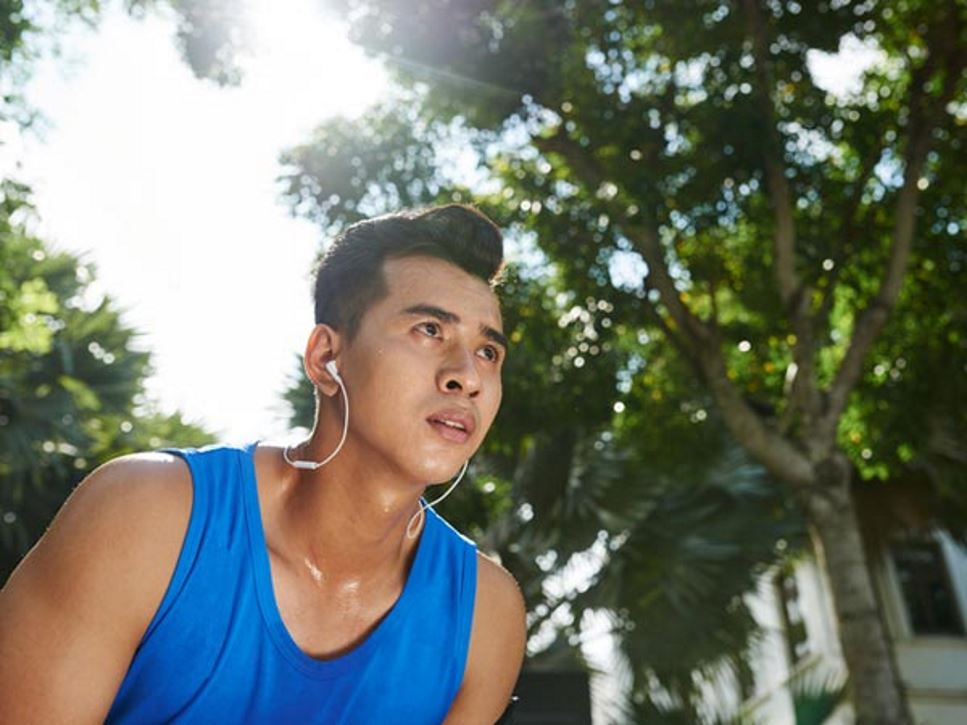Many people flock outside in warm weather to jog, play basketball or do yard work. But when the temperature rises, "easy" exercise becomes a huge physical undertaking, and intense exercise can be deadly. If your body's temperature regulation system is overtaxed, you're at risk of developing a heat-related illness. Here's what you need to do to protect yourself in extreme summer heat.
Keep an Eye on the Weather
Exercise and warm weather increase your core body temperature. When you combine the two — for example, when you run on a hot, humid day — even seasoned athletes need to exercise caution. Your body cools itself by sweating, but cooling down is harder in humid weather because perspiration doesn't evaporate as quickly from your skin. Your heart rate rises as your body works hard to keep itself cool.
Before you lace up your running shoes or head to the tennis courts, take a look at the weather report. If the temperature or humidity is high, scale back your workout. A workout that feels easy on a temperate day can be dangerously intense on a hot, humid afternoon. Respect your body and your own limitations. People with larger bodies, the elderly, kids and those not accustomed to rigorous exercise should be extremely cautious in hot weather.
Dress Appropriately
When exercising in heat, what you wear matters. Light-colored, sweat-wicking clothing is best for hot weather; dark, heavy clothes can make you even hotter. Gear — such as protective padding or helmets — also traps heat and raises your body temperature. If you have to suit up, shorten your workout intensity and duration.
Wear UV-blocking sunglasses and don't forget the sunscreen. Choose water-resistant sunscreen with a minimum of SPF 30 or higher (the most effective products say "broad spectrum" or "UVA/UVB protection" on their labels), and apply it 30 minutes before going out. Continue to reapply sunscreen according to the package directions. Sunburn decreases your body's ability to cool itself.
Hydrate, Hydrate, Hydrate
When the temperature heats up, make sure you drink enough fluids throughout the day to stay hydrated, and enjoy water-rich foods including crisp lettuce, watermelon, grapefruit, broccoli and tomatoes.
It's surprisingly easy to lose a few pounds of water weight through sweating. Weigh yourself before and after working out, and replace each pound of weight lost with 2 to 3 cups of water. Water is a good choice because it moves quickly through your digestive tract and into your tissues. If you're sweating heavily or exercising for more than 60 minutes, sports drinks can help your body rehydrate more efficiently.
Know the Warning Signs: Heat Exhaustion and Heat Stroke
Dehydration is a serious medical condition. Exercising in hot, humid weather can rapidly raise your body's core temperature, putting you at risk of heat exhaustion or heat stroke.
Heat exhaustion is a milder form of heat-related illness that can develop after several days of exposure to high temperatures, and inadequate or unbalanced replacement of fluids.
Signs of heat exhaustion include:
- Heavy sweating
- Muscle cramps
- Fatigue
- Weakness
- Dizziness
- Headache
- Fainting
- Nausea or vomiting
- Dark urine
- Cool, moist skin
If heat exhaustion is untreated, it may progress to heat stroke.
Heat stroke is the most serious heat-related illness. Body temperature may rise to 103°F or higher within 10 to 15 minutes.
With heat stroke victims, look for the following symptoms:
- Dry, hot skin (no sweating)
- Rapid, weak pulse
- Confusion
- A body temperature of above 103°F
- Seizures
- Unconsciousness
If you see someone with any warning signs of heat stroke, call 911 immediately, then cool the victim however you can (for example, move them to a shady spot or an air-conditioned location, or wet their skin with a sponge or hose).
References
Find a Nutrition Expert
Looking for credible nutrition information and recommendations? The Academy of Nutrition and Dietetics' network of credentialed food and nutrition practitioners are ready to help!

